§ 1. The Pahlavi text treated in this article was first published by M. E. BLOCHET from a codex of the Bibliothėque Nationale of Paris—the manuscrit Supplément persan, no. 1216, p. 1—4— in the Revue de L'Histoire des Religions, Paris 1895, vol. 32, pp. 18—23 of the appendix, and translated by him with notes in the same volume of the Revue pp. 233—241. It was published for the second time in the PahlT. II, pp. 109—114 and edited by JAMASP-ASANA (Bombay 1913) with collations from the mss. JE. JJ. MK. and DP.
1. 1For the orthogr. cf. KH. p. 55. — 2P.  — The other mss. have
— The other mss. have  for it. A. reads aêst, the Dari expr. for êstêt! — 3 The copyist has written the ideogram for tar “aside, besides” instead of
for it. A. reads aêst, the Dari expr. for êstêt! — 3 The copyist has written the ideogram for tar “aside, besides” instead of  tarr “fresh”, MP. 3; cf. for a similar mistake KH. § 69. no. 3. — 4 Mss.
tarr “fresh”, MP. 3; cf. for a similar mistake KH. § 69. no. 3. — 4 Mss.  — 5 For the expr. cf. KH. §93.
— 5 For the expr. cf. KH. §93.
a Mp.  (VULLERS). — bFrP.4.4. — MP,
(VULLERS). — bFrP.4.4. — MP, . — c Cf. MP.
. — c Cf. MP.  (VULLERS).
(VULLERS).
2. 1 Thus in Ta. J.J.  P.
P. — 2 It is written here with the vowel
— 2 It is written here with the vowel  , which serves as a connecting link between °n of ān and °m the encl. pron. 1. sing. — 3 P.
, which serves as a connecting link between °n of ān and °m the encl. pron. 1. sing. — 3 P. —4 Cf. MidPT.
—4 Cf. MidPT.  , BTHL. zAirWb. 122. and pref. § 6.
, BTHL. zAirWb. 122. and pref. § 6.  salso buz “o goat”, as also later on. BLOCHET translated the word differently first “goat” and then “I”. The vocative is necessary, as it shows us who begins to speak first. The original text had perhaps
salso buz “o goat”, as also later on. BLOCHET translated the word differently first “goat” and then “I”. The vocative is necessary, as it shows us who begins to speak first. The original text had perhaps  buz as “o goat. I”. — 5 An unusual orthogr. for
buz as “o goat. I”. — 5 An unusual orthogr. for  . is written for
. is written for  ace. to the Sassanian pronunciation of p, as also in §§ 45, 48.
ace. to the Sassanian pronunciation of p, as also in §§ 45, 48.
a A. reads êyâ, voc. part., a Dari expr.; B. reads dēn “(for the men of) the religion” and takes martōmān-dātastān rā with § 1. I take the word to mean “judgment”. because in our story the contending parties are so insignificant that the necessity of a judge, who pronounces his decision in favour of one or the other party is absolutely unavoidable, just as it is in the Persian
with § 1. I take the word to mean “judgment”. because in our story the contending parties are so insignificant that the necessity of a judge, who pronounces his decision in favour of one or the other party is absolutely unavoidable, just as it is in the Persian 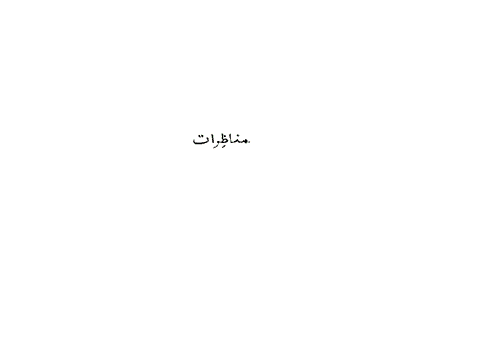 Of course in our story there is no decision arrived at as to the superiority of one of the two contending parties over the other, as it is expected, but they go their different ways after enumerating their points of superiority. — bA. takes it for a Dari form for
Of course in our story there is no decision arrived at as to the superiority of one of the two contending parties over the other, as it is expected, but they go their different ways after enumerating their points of superiority. — bA. takes it for a Dari form for  hom “I am”!, B. for an encl. pron. 1. sing., s. no. 2. — cA. reads am nipartit “I argued”, which is certainly wrong: for meaning comp. hamnipartih “fight, combat, duel1īt goes back to a denominative
hom “I am”!, B. for an encl. pron. 1. sing., s. no. 2. — cA. reads am nipartit “I argued”, which is certainly wrong: for meaning comp. hamnipartih “fight, combat, duel1īt goes back to a denominative  nipartītan “to fight, to combate”. — dLit. “upper”, hence “superior”. A. “more deserving”, of course a free rendering.
nipartītan “to fight, to combate”. — dLit. “upper”, hence “superior”. A. “more deserving”, of course a free rendering.
3. 1Cf. pref. § 6. — 2 P.  — 3 This
— 3 This  is of course redundant, as it is already expressed in
is of course redundant, as it is already expressed in  um. Or does it stand for
um. Or does it stand for  om. i. e.
om. i. e.  hom “I am”?
hom “I am”?
aThe name of the seventh part of the world situated in the middle of the other six. Aw.  s. BTHL. AirWb. 1864. bProperly speaking “having a similar body: having the same dimension”; for meaning comp. MP.
s. BTHL. AirWb. 1864. bProperly speaking “having a similar body: having the same dimension”; for meaning comp. MP.  “standing in the same rank, on the same footing; a colleague”. MP.
“standing in the same rank, on the same footing; a colleague”. MP.  “having the same colour”, and so forth.
“having the same colour”, and so forth.
4. aMP. “plank, board”; for the orthogr. s. KH. § 8, no. 2. and PahlT. I, 118, 3. where
“plank, board”; for the orthogr. s. KH. § 8, no. 2. and PahlT. I, 118, 3. where  taxtak, cf. AnnLw. taxtak. — b MP.
taxtak, cf. AnnLw. taxtak. — b MP.  “shuttle”; ArmLw. makoik “boat, canoe”. The final ān, the pl. suff. is peculiar, s. āturān-vazāk § 8. — c I prefer this translation to those of A. and B.. taking makūkān in the sense of Ann. makoik. because immediately in §5 the sail of the ship is mentioned. A. translates “I am the pin (?) of the shuttle”, whereas B. “I become the shuttle and the board”.
“shuttle”; ArmLw. makoik “boat, canoe”. The final ān, the pl. suff. is peculiar, s. āturān-vazāk § 8. — c I prefer this translation to those of A. and B.. taking makūkān in the sense of Ann. makoik. because immediately in §5 the sail of the ship is mentioned. A. translates “I am the pin (?) of the shuttle”, whereas B. “I become the shuttle and the board”.
5. a MP.  “a variegated cloth with which the house and other buildings are decorated on festival days” (VULLERS), comp. Aw. fraspāt “cushion, pillow”, BTHL. AirWb. 1003; “the beam of the roof” (VIULERS). B. takes the word in the latter sense, whereas the meaning “mast” given to this word by A. is incomprehensible. — b MP.
“a variegated cloth with which the house and other buildings are decorated on festival days” (VULLERS), comp. Aw. fraspāt “cushion, pillow”, BTHL. AirWb. 1003; “the beam of the roof” (VIULERS). B. takes the word in the latter sense, whereas the meaning “mast” given to this word by A. is incomprehensible. — b MP.  (VULLERS and ZENKER) ; the mast of the ship” (VULLERS). B. takes the word in this latter sense.
(VULLERS and ZENKER) ; the mast of the ship” (VULLERS). B. takes the word in this latter sense.
6. 1Inserted in order to complete the sense as very often in this text, as in § 7. 12. 13 and so forth; comp. Aw. paiti ‘with (an instrument)”, “per”; also used as a preposition of place “where” (cf. § 7), s. BTHL. AirWb. 823. The final  is the encli. pron. 3. sg. It is always placed after the substantive. — 2P.
is the encli. pron. 3. sg. It is always placed after the substantive. — 2P. — 3 P.,.
— 3 P.,.
a For reading and meaning cf. MidPT. kariši for kunišn. IF. 38, 21. ker- is a dialectical form for kun- in MP. central dialects, s. GIrPh. I. 281. 389, 394, 399. — b MP.  ; s. GIrPh. I a 303. For gyāk-. s. KH. § 9, no. 3. BARTHOLOMAE takes the word grammatically in the plur. corresponding to
; s. GIrPh. I a 303. For gyāk-. s. KH. § 9, no. 3. BARTHOLOMAE takes the word grammatically in the plur. corresponding to  as also in the following paragraphs, cf. TEDESOO, Anzeiger Wien. Ak. d. W.. phil.-hist. Kl. J921. 1 f. This form without the plur. suffix then stands apparently for the nom. and ace. plur. — c
as also in the following paragraphs, cf. TEDESOO, Anzeiger Wien. Ak. d. W.. phil.-hist. Kl. J921. 1 f. This form without the plur. suffix then stands apparently for the nom. and ace. plur. — c vīrāzēnd pres. 3. plur. from
vīrāzēnd pres. 3. plur. from  vīrāzītan “to arrange, to bring into order”, lit. “to rule, to govern” (Ai. vi-rājati “he masters” (PW.). denom. from
vīrāzītan “to arrange, to bring into order”, lit. “to rule, to govern” (Ai. vi-rājati “he masters” (PW.). denom. from  vīrāz “ruler”, comp. Aw. vīrāz. a proper nonn. cf. BTHL. AirWb. 1454. further comp. Aw. rāzan “arrangement, commandment, rule and regulation” for which the Pahl, version vīrāδišn, ārāδišn, s. BTHL. AirWb. 1526. The word in question is of course connected in its meaning with MidP. ārāstan and virāstan (virāδēnd pres. 3. plur., s. KH. § 57) “to arrange, to bring into order: to decorate”. MP.
vīrāz “ruler”, comp. Aw. vīrāz. a proper nonn. cf. BTHL. AirWb. 1454. further comp. Aw. rāzan “arrangement, commandment, rule and regulation” for which the Pahl, version vīrāδišn, ārāδišn, s. BTHL. AirWb. 1526. The word in question is of course connected in its meaning with MidP. ārāstan and virāstan (virāδēnd pres. 3. plur., s. KH. § 57) “to arrange, to bring into order: to decorate”. MP. 
 cf. HORX. NpEt. 4 and 300. BAKTHOI-OMAE considers the word to be corrupted form of
cf. HORX. NpEt. 4 and 300. BAKTHOI-OMAE considers the word to be corrupted form of  brāzēnd “they make shining, clear”, cf. AirWb. 50. no. 1; further cf. Nir. 83. 2
brāzēnd “they make shining, clear”, cf. AirWb. 50. no. 1; further cf. Nir. 83. 2  , peculiarly often
, peculiarly often  for
for  before
before  — d From Aw.
— d From Aw. 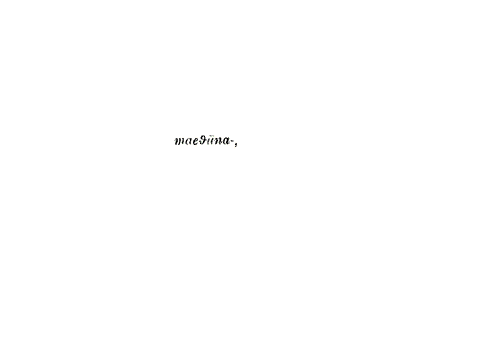 , MP.
, MP.  (VULLERS) ; for meaning comp.
(VULLERS) ; for meaning comp.  mēhal “tent, camp”, PahlT. 5, 21. — e From Aw. nmāna- “house” MP.
mēhal “tent, camp”, PahlT. 5, 21. — e From Aw. nmāna- “house” MP.  — f For the expr. mēhan u mān, s. PahlT. 86. 1, 9. 163. 17, 166. 16. where mān u mehān occurs. BARTHOLOMAE translates it “dwelling (room) and house”. Cf. BTHL. MiranM. III. 36. no. 3.
— f For the expr. mēhan u mān, s. PahlT. 86. 1, 9. 163. 17, 166. 16. where mān u mehān occurs. BARTHOLOMAE translates it “dwelling (room) and house”. Cf. BTHL. MiranM. III. 36. no. 3.
7. 1Mss. have a redundant  after this word.
after this word.
a MP.  Arab.
Arab. “a wooden mortar” (VULLERS); “a large wooden mortar in which rice is beaten off” (STEINGASS). A. renders the word by “the thrashing pin”, whereas B. by “pestle”, cf. Aw. gavāza- “the goad for cattle” BTHL. AirWb. 511. ArmLw. gavazan, MP.
“a wooden mortar” (VULLERS); “a large wooden mortar in which rice is beaten off” (STEINGASS). A. renders the word by “the thrashing pin”, whereas B. by “pestle”, cf. Aw. gavāza- “the goad for cattle” BTHL. AirWb. 511. ArmLw. gavazan, MP. (VULLERS and STEINGASS). —
(VULLERS and STEINGASS). —
b Lit. “they beat”, cf. MP. 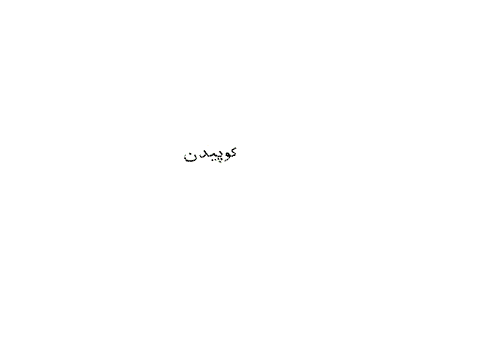 and
and  which are related to.
which are related to. “to beat”; comp. Ai. kopaya- caus. from. kup- “to set in motion, to shatter, to make shivering”. — c FrP. 4. 1. — MP.
“to beat”; comp. Ai. kopaya- caus. from. kup- “to set in motion, to shatter, to make shivering”. — c FrP. 4. 1. — MP.  BARTHOLOMAE considers
BARTHOLOMAE considers  to be perhaps uzvāy “blowing up”, i. e. “flaming up by blowing”, cf. § 34, no. b. — d MP.
to be perhaps uzvāy “blowing up”, i. e. “flaming up by blowing”, cf. § 34, no. b. — d MP. ArmLw. brinj.
ArmLw. brinj.
8. l Mss.  probably for
probably for  .
.
a Cf. MP.  “a pair of bellows”. derived from MP.
“a pair of bellows”. derived from MP.  “to blow”. — b Pres. partic. fro
“to blow”. — b Pres. partic. fro vazitan “to blow”; comp. MP. M
vazitan “to blow”; comp. MP. M — c The form is here most probably the plurale tantnm. but comp. makūkāntaxt § 4.
— c The form is here most probably the plurale tantnm. but comp. makūkāntaxt § 4.
9. a Comp. ArmLw. moik. and MidP.  mūčak § 35. which is a contracted form of *mōk-čak “little shoe”, dimin. from
mūčak § 35. which is a contracted form of *mōk-čak “little shoe”, dimin. from  mōk. MP.
mōk. MP.  , properly speaking “a small shoe; the shoe of a woman”, with which comp. ArmLw. mučak. — b Cf. MP.
, properly speaking “a small shoe; the shoe of a woman”, with which comp. ArmLw. mučak. — b Cf. MP. 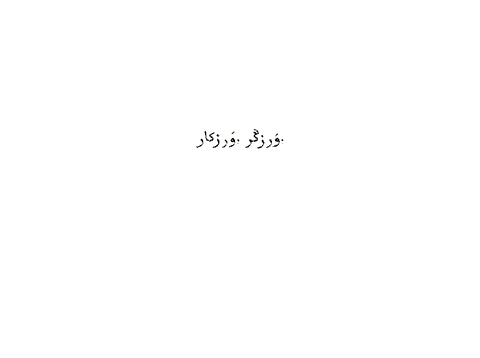 and
and  “a cultivator, a peasant” (VULLLERS).
“a cultivator, a peasant” (VULLLERS).
10. 1Thus also P., whereas PahlT. 109. 12 has 
a MP. Arab, dual
Arab, dual  “the wooden-shoe (for the bath or for walking in the mud)” (ZENKER); ArmLw. nal “the horse-shoe”. The word is borrowed from Arabic, A. only transcribes the word by vârîn?: B. further compares the word with MP.
“the wooden-shoe (for the bath or for walking in the mud)” (ZENKER); ArmLw. nal “the horse-shoe”. The word is borrowed from Arabic, A. only transcribes the word by vârîn?: B. further compares the word with MP.  “shoes” (STEINGASS and VULLERS). — bMP.
“shoes” (STEINGASS and VULLERS). — bMP. 
11. a MP. AI. raśanā- s. IIORN NpEt. 137. — b Lit. “to thee the feet”, ethical dat.. s. § 12.
AI. raśanā- s. IIORN NpEt. 137. — b Lit. “to thee the feet”, ethical dat.. s. § 12.
12. 1 P.  , most probably the copyist's mistake for
, most probably the copyist's mistake for  , MK. J.J. and JE. have
, MK. J.J. and JE. have  2 gardūn written as one word.
2 gardūn written as one word.
a MP. “wood, a block of wood, a post of wood” (VULLERS). B. correctly takes it to mean the heavy long piece of wood which is tied to the neck of cattle very rarely to that of goats and sheep, which prevents them from running away and from attacking men. A. translates it “the stick”. — b MP.
“wood, a block of wood, a post of wood” (VULLERS). B. correctly takes it to mean the heavy long piece of wood which is tied to the neck of cattle very rarely to that of goats and sheep, which prevents them from running away and from attacking men. A. translates it “the stick”. — b MP.  to “kiss.” the vulgar and onomatopoetic form for
to “kiss.” the vulgar and onomatopoetic form for  cf. HORN NpEt. 54. Arm. pacem. paganem “I kiss” are also onomatopoetic. B. “on fait courber”. “they make bend”, but then the reáding? — c Lit. “to thee the neck”, ethical dat.. s. § 11. — d A. reads 2 gardūn ‘two apples of thy neck”, lit. “two necks”, s. no. 1.
cf. HORN NpEt. 54. Arm. pacem. paganem “I kiss” are also onomatopoetic. B. “on fait courber”. “they make bend”, but then the reáding? — c Lit. “to thee the neck”, ethical dat.. s. § 11. — d A. reads 2 gardūn ‘two apples of thy neck”, lit. “two necks”, s. no. 1.
13. 1All mss. except P.  .— 2 Mss.
.— 2 Mss. 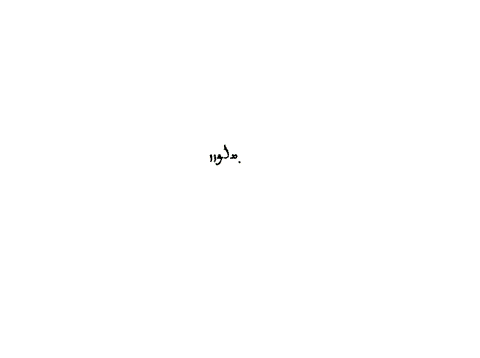 — 3 A. reads sarkûnak vazênd.
— 3 A. reads sarkûnak vazênd.
a MP.  — b It seems that A. connects vazênd with MidP. āvēxtan. MP.
— b It seems that A. connects vazênd with MidP. āvēxtan. MP.  which is impossible to do as not only the prefix ā- but also the long ē are missing in vazênd. B. renders “they attach or bind (thee) with the head lowered”. — c MP.
which is impossible to do as not only the prefix ā- but also the long ē are missing in vazênd. B. renders “they attach or bind (thee) with the head lowered”. — c MP. (VULLERS and SIEINGASS). Comp. for
(VULLERS and SIEINGASS). Comp. for  MidP. ākustan ‘to hang up”, KH. § 26, MidPT. āgust. A. takes the
MidP. ākustan ‘to hang up”, KH. § 26, MidPT. āgust. A. takes the  of the following word with
of the following word with  and reads sārkūnak “headlong”, which even supposing to be a corrupted form of sārakūnak can hardly explain the final -ak or most probably on the analogy of MidP. *ĉiyōn-ak, MP.
and reads sārkūnak “headlong”, which even supposing to be a corrupted form of sārakūnak can hardly explain the final -ak or most probably on the analogy of MidP. *ĉiyōn-ak, MP.  “how?”, “quomodo”.
“how?”, “quomodo”.
14. 1 P.  .
a FrP. 4. 4. — Cf. MP.
.
a FrP. 4. 4. — Cf. MP.  — b Cf. § 8, no c. — c Comp. MP.
— b Cf. § 8, no c. — c Comp. MP. 
 “preparation, order”, from which the denom.
“preparation, order”, from which the denom. 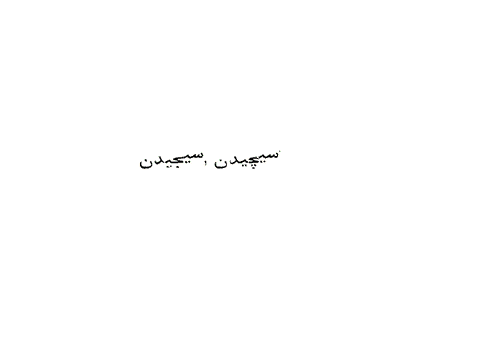 “to prepare; to dispatch of” (VULLERS and STEINGASS). Most probably the meaning “preparation” is developed from the original meaning “pain”, “the successful passing through pain”, and hence “preparation”, cf. HORN NpEt. 291. Here of course I take the word adverbially “through, and through”, MHG. “gar”. and the expr. sēž brištan equal to MP.
“to prepare; to dispatch of” (VULLERS and STEINGASS). Most probably the meaning “preparation” is developed from the original meaning “pain”, “the successful passing through pain”, and hence “preparation”, cf. HORN NpEt. 291. Here of course I take the word adverbially “through, and through”, MHG. “gar”. and the expr. sēž brištan equal to MP.  “to cook thoroughly”. Or does the word signify some product of the goat?
“to cook thoroughly”. Or does the word signify some product of the goat?
15. a MP.  , as to the orthogr. cf. § 18, where
, as to the orthogr. cf. § 18, where  sāyak occurs. A. renders the word by “the umbrella”, whereas P. by “the fan, the umbrella”. But the meaning is far-fetched, as the MP. word for “umbrella” is
sāyak occurs. A. renders the word by “the umbrella”, whereas P. by “the fan, the umbrella”. But the meaning is far-fetched, as the MP. word for “umbrella” is  and not
and not  BARTHOLOMAE. — b MP.
BARTHOLOMAE. — b MP.  A. and B. takes “the word in the ace. of time — “in summer”; B. also takes the word to mean parasol”, lit. “the shade of summer”. — c The word šahrdārān can hardly mean “the satraps” in this and other passages. The mean, “the rulers” — cf. MP.
A. and B. takes “the word in the ace. of time — “in summer”; B. also takes the word to mean parasol”, lit. “the shade of summer”. — c The word šahrdārān can hardly mean “the satraps” in this and other passages. The mean, “the rulers” — cf. MP.  —suits everywhere very well.
—suits everywhere very well.
16. 1 These two words form part of § 15 in PahlT. 110. 1, but they properly belong to § 16. — 2 In P.  i. e. three words.
a FrP. 5. 2. — MP.. A. reads it kharya and leaves off untranslated, whereas B. has quite misunderstood the whole sentence. He translates: “I am the arsh (? bee-hive ?) of those who collect the honey”. — b Cf. § 9, no. b. — c FrP. 5. 3; MP.
i. e. three words.
a FrP. 5. 2. — MP.. A. reads it kharya and leaves off untranslated, whereas B. has quite misunderstood the whole sentence. He translates: “I am the arsh (? bee-hive ?) of those who collect the honey”. — b Cf. § 9, no. b. — c FrP. 5. 3; MP.  A. reads it gôbashyâ and leaves out untranslated: cf. no. a. — d MP.
A. reads it gôbashyâ and leaves out untranslated: cf. no. a. — d MP.  “a chest, a casket” (STEINGASS), “a basket, especially for bread; a box for perfume-sellers; a surgical box” (VULLEES). A. reads it tufang, MP.
“a chest, a casket” (STEINGASS), “a basket, especially for bread; a box for perfume-sellers; a surgical box” (VULLEES). A. reads it tufang, MP.  “musket”, but then the final
“musket”, but then the final  remains unexplained. B. translates it “spinning-wheel and spindle”, thus he reads * ? * u
remains unexplained. B. translates it “spinning-wheel and spindle”, thus he reads * ? * u  ūk, MP.
ūk, MP. 
17. 1 JJ. and P.  with the var.
with the var.  — 2 Inserted in order to complete the sense. — 3 Thus P. — 4 Thus P.
— 2 Inserted in order to complete the sense. — 3 Thus P. — 4 Thus P.
a MP.  MidP. dārūk “medicine.” — b For meaning comp. čōpakūn- hušnas. KH. § 12. A. reads êyâ “behold”, cf. § 2, no. a. whereas B. dānā physician“, and says in the note lit. “savant”: the arab. words
MidP. dārūk “medicine.” — b For meaning comp. čōpakūn- hušnas. KH. § 12. A. reads êyâ “behold”, cf. § 2, no. a. whereas B. dānā physician“, and says in the note lit. “savant”: the arab. words  which signify “physician” originally meant “a learned man, a savant”. — c MP.
which signify “physician” originally meant “a learned man, a savant”. — c MP.  ArmLw. bžišk. A. translates the sentence “which the consulting physicians carry from place to place”. This is from the grammatical stand point quite incorrect. If he reads bižaškān-bižašk, it must mean “the chief physician” or lit. “the physician of physicians” like šāhān-šāh “the king of kings”. Most probably he has left out bižišk in the translation and taken bižaškān plur. as governing the plur. verb barēnd.
ArmLw. bžišk. A. translates the sentence “which the consulting physicians carry from place to place”. This is from the grammatical stand point quite incorrect. If he reads bižaškān-bižašk, it must mean “the chief physician” or lit. “the physician of physicians” like šāhān-šāh “the king of kings”. Most probably he has left out bižišk in the translation and taken bižaškān plur. as governing the plur. verb barēnd.
18.19. 1 P. 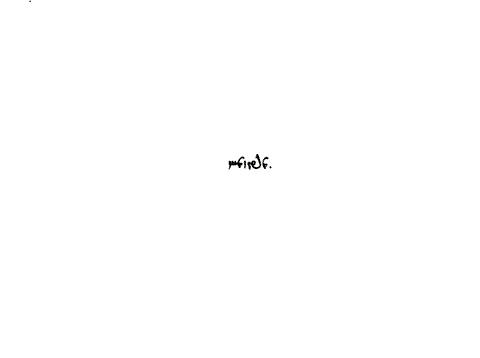
a AMP.  — b Cf. MP.
— b Cf. MP. for the dimin. suffix -īčak. s. Glr Ph. I a 281. — c FrP. 30.11.—Cf. MP.
for the dimin. suffix -īčak. s. Glr Ph. I a 281. — c FrP. 30.11.—Cf. MP. — d For orthogr. s. § 15. no. a. § e MP.
— d For orthogr. s. § 15. no. a. § e MP. ![]() “wounded, siok. infirm”; cf. gyān-zastak “wounded to the life” § 69; for meaning cf. GIrPh. I b 142. Lit. “trampled (under foot)”. ppp. from
“wounded, siok. infirm”; cf. gyān-zastak “wounded to the life” § 69; for meaning cf. GIrPh. I b 142. Lit. “trampled (under foot)”. ppp. from ![]() cf. BTHL.. MiranM. II. 27. — f Paz. kārdahagã, Mx. 4. C. 37. 36. Ta has
cf. BTHL.. MiranM. II. 27. — f Paz. kārdahagã, Mx. 4. C. 37. 36. Ta has ![]() kārdānān “ministers”. MP.
kārdānān “ministers”. MP. ![]() (VULLERS). A. translates “workers” perhaps reading the variant kākarān, MP.
(VULLERS). A. translates “workers” perhaps reading the variant kākarān, MP. ![]() — g Lit. “new1”, MP.
— g Lit. “new1”, MP. ![]() , cf. HORN, NpEt. 234. — h MP.
, cf. HORN, NpEt. 234. — h MP. ![]() “a litle man. a manikin” (VULLERS), diniin. from
“a litle man. a manikin” (VULLERS), diniin. from ![]() “man”; for etyin. cf. BTHL. zAirWIi. 70. The sing, is used here in the collective sense with the verb in the plur. FrP. 11. 1. — k Denom. from MidP.
“man”; for etyin. cf. BTHL. zAirWIi. 70. The sing, is used here in the collective sense with the verb in the plur. FrP. 11. 1. — k Denom. from MidP. ![]() arž “value, price”, cf. HN. 1. 9. 10. and PahlY. 1. 1. MP.
arž “value, price”, cf. HN. 1. 9. 10. and PahlY. 1. 1. MP. ![]() — 1 Denom. from
— 1 Denom. from ![]() vinās “sin”: for meaning cf. AY. 86. 5.
vinās “sin”: for meaning cf. AY. 86. 5.
20. 1 P. ![]() other uiss.
other uiss. ![]() as two words. — 2 Thus P.. cf. § 18. — 3 Thus Ta.. P.
as two words. — 2 Thus P.. cf. § 18. — 3 Thus Ta.. P. ![]() other mss. have
other mss. have ![]() whose
whose ![]() must have been originally written as a variant of
must have been originally written as a variant of ![]() of preceding word, cf. PahlT. 110. no. 25.
of preceding word, cf. PahlT. 110. no. 25.
a The above translation remains doubtful. A. leaves out the whole paragraph upto the first six words of § 21 untranslated. B. renders it as follows:— “(§ 18). When men appreciate me according to iny exact value, and do not inflict me any injury (then). I wish that during the whole day there may be for them freshness (, i. e. the weather may be refreshing the whole day). Men who have neither bread nor wine nourish themselves from my fruit, which hang continually (on my branches)”. lie says in the note that this translation is conjectural. — b MP. ![]() or zarrēn “golden”. MP.
or zarrēn “golden”. MP.![]() cf. § 51, no. a — c cf. Aw. vaδay, vaiδi, BTHL. AirWb. 1344. — d Opt. 3. sing, from
cf. § 51, no. a — c cf. Aw. vaδay, vaiδi, BTHL. AirWb. 1344. — d Opt. 3. sing, from ![]() Šutan “to go, to be, to become”, FrP. 20. 6. MP.
Šutan “to go, to be, to become”, FrP. 20. 6. MP. ![]() — e FrP. p. 16. — MP.
— e FrP. p. 16. — MP. ![]() — f Contracted form for
— f Contracted form for ![]() āvēxt hand. lit. “are hanged”. cf. MP
āvēxt hand. lit. “are hanged”. cf. MP ![]() — g Lit.“borne together”, cf. MP.
— g Lit.“borne together”, cf. MP. ![]() .
.
21. 1 These six words form part of § 20 in PahlT. 110. 7. 8, but they properly belong to § 21. — 2 For orthogr. cf. § 4, no. a. — 3 Thus P. for ![]() cf. no. 2. — 4 P. has
cf. no. 2. — 4 P. has ![]() — 5 P. has
— 5 P. has ![]() — 6 Thus all. P. and Ta.
— 6 Thus all. P. and Ta.![]() — 7 Or bovēt (cf. ai. bhávati). An unusual orthogr. for the ideogram
— 7 Or bovēt (cf. ai. bhávati). An unusual orthogr. for the ideogram ![]() as also in § 26. At any rate either
as also in § 26. At any rate either ![]() is redundant, cf.
is redundant, cf. ![]() bavāt “may be” opt. 3. sing. PahlT. 16. 8. 12. 13, 14, 15. 16, 17. 7 for the ideogr.
bavāt “may be” opt. 3. sing. PahlT. 16. 8. 12. 13, 14, 15. 16, 17. 7 for the ideogr. ![]() : the word occurs in the colophon of the Ayātkār i. Zarēran written by the Persian scribe Mihr-Āwān Kai-khŪsrū in 691 A. V. Thus
: the word occurs in the colophon of the Ayātkār i. Zarēran written by the Persian scribe Mihr-Āwān Kai-khŪsrū in 691 A. V. Thus ![]() must also have its origin in the copy of this scribe. — 8 For orthogr.
must also have its origin in the copy of this scribe. — 8 For orthogr. ![]() cf. no. 2, 3. and § 4, no. a Mss.
cf. no. 2, 3. and § 4, no. a Mss.![]()
a Thus also B. MidPT. vāxt. Gab. vāt “said, spoken”, ppp. from *vāxtan “to say, to speak”, rāčēnd. cf. § 27, pres. 3. plur., MidPT. vāčēnd “they say” comp. MP.![]() “to flatter, to sing”, s. BTHL. zAirWb. 216. 217. — b For karēt, s. § 6, no. a. — c Cf. MP.
“to flatter, to sing”, s. BTHL. zAirWb. 216. 217. — b For karēt, s. § 6, no. a. — c Cf. MP. ![]() also
also ![]() . FrP. 23. 4. Thus also H. A. translates: “raises forth (frâz shânêt) its head unto me”. It is difficult to find any justification for this reading and meaning of shânêt. as there, is no word in the known MidP. and MP. lexiea that may be compared to it. Or has he taken it to be equal to MP.
. FrP. 23. 4. Thus also H. A. translates: “raises forth (frâz shânêt) its head unto me”. It is difficult to find any justification for this reading and meaning of shânêt. as there, is no word in the known MidP. and MP. lexiea that may be compared to it. Or has he taken it to be equal to MP. ![]() “to strew, to scatter”? BAKTHOLOMAE reads sar-om frāč šācēt “he raises [his] head unto me (ethical dat)”, and takes šāvēt for the cans, of šutan “to be”. — d Denoin. from MidP. *rān, gAw. rāna- “a disputer, a fighter”. Cf. BTHL. AirWb. 1523. A. reads rāne “thou drivest at;” B. lakhvâr + ak “he who is behind, hence inferior”. — e Pres. 2. sing., for meaning s. § 3, no. c. — f Lit. “fight” denom. from
“to strew, to scatter”? BAKTHOLOMAE reads sar-om frāč šācēt “he raises [his] head unto me (ethical dat)”, and takes šāvēt for the cans, of šutan “to be”. — d Denoin. from MidP. *rān, gAw. rāna- “a disputer, a fighter”. Cf. BTHL. AirWb. 1523. A. reads rāne “thou drivest at;” B. lakhvâr + ak “he who is behind, hence inferior”. — e Pres. 2. sing., for meaning s. § 3, no. c. — f Lit. “fight” denom. from ![]() patktār “struggle, combat, contest”, MP.
patktār “struggle, combat, contest”, MP. ![]() s. KH. 95. A. translates: “When my doings will be listened to, shame will repel
s. KH. 95. A. translates: “When my doings will be listened to, shame will repel ![]() that foolish utterance of thine”. B. rendering is quite obscure. It is as follows: “because it is I. who always furnishes to little babies their milk, as much as they desire. They protect me on the pasture-ground”. — g Comp. MP.
that foolish utterance of thine”. B. rendering is quite obscure. It is as follows: “because it is I. who always furnishes to little babies their milk, as much as they desire. They protect me on the pasture-ground”. — g Comp. MP. ![]() “a bad fellow, a corrupter. destroyer”: comp. BTHL. AirWb. 1790.
“a bad fellow, a corrupter. destroyer”: comp. BTHL. AirWb. 1790.
22. 1 Thus P., mss. ![]() — 2 P.
— 2 P. ![]() — 3 The copyist has written this word with too many hooks
— 3 The copyist has written this word with too many hooks ![]() there are eleven
there are eleven ![]() in P., whereas other mss. have eight. — 4 Mss. 1.— 5 P.
in P., whereas other mss. have eight. — 4 Mss. 1.— 5 P. ![]() other mss.
other mss. ![]()
aThis passage is very obscure. The translations of A. and B. differ from each other very much.Google Scholar A. renders it as follows: “Lofty art thou, tall demon! Majestic (bayān ?) thou art; thou resemblest the demon of demons which was over the head of Jamshît; thou hast become complete at that auspicious period and day of the demons”. ![]() version is quite.unintelligible: it runs as follows: “I am honoured just as a great king wished. The sovereignty, which Jemshît possessed for a long time, it is through the milk, that it became prosperous*): it is by him. that the evil was enchained which the demons caused men”. —b MP.
version is quite.unintelligible: it runs as follows: “I am honoured just as a great king wished. The sovereignty, which Jemshît possessed for a long time, it is through the milk, that it became prosperous*): it is by him. that the evil was enchained which the demons caused men”. —b MP.![]() — c MP.
— c MP. ![]() , comp. GF. 3. 88. A. renders it “demon of demons”, but it can be read Šaidā, and not šaidā-ān šaidā! — d Thus literally. MP.
, comp. GF. 3. 88. A. renders it “demon of demons”, but it can be read Šaidā, and not šaidā-ān šaidā! — d Thus literally. MP.![]() Aw. yimaχšaeta, cf. BTHL. AirWb. 1300. — e FrP. 31. 1. — MP.
Aw. yimaχšaeta, cf. BTHL. AirWb. 1300. — e FrP. 31. 1. — MP. ![]() The word is a pseudoideogram for
The word is a pseudoideogram for ![]() hangām- It seems that it has its origin in the orthography
hangām- It seems that it has its origin in the orthography ![]() , then
, then ![]() through the prolongation of
through the prolongation of ![]() comp. KH. 55. I think it quite far fetched to consider the word as a corrupt orthography for Heb.
comp. KH. 55. I think it quite far fetched to consider the word as a corrupt orthography for Heb.![]() S. Pahl. Paz. Gl. p. 61.
S. Pahl. Paz. Gl. p. 61.
23. a MP. ![]() (VULLERs); dāru is most probably a transcription of Aw. dāuru. — b A. translates: “0 men! (Is this) too the tree of immortal beverage (anush-dârû), the tree, whose top was golden!” But as no such claim is made by the tree in the preceding part of the stoiy I am not inclined to read
(VULLERs); dāru is most probably a transcription of Aw. dāuru. — b A. translates: “0 men! (Is this) too the tree of immortal beverage (anush-dârû), the tree, whose top was golden!” But as no such claim is made by the tree in the preceding part of the stoiy I am not inclined to read ![]() anush-dârû. If annsh is read, then the word must be written
anush-dârû. If annsh is read, then the word must be written ![]()
*) B. says in the note : “because during the whole time of his sovereignty he did not nourish himself but on the milk of the goaf”.
24. 1 Mss. ![]() — 2 Mss.
— 2 Mss. ![]() — 3 For read. cf. § 6. no. a It is written here plene. — 4 For read, and mean. cf. KH. prof. § 11. MP.
— 3 For read. cf. § 6. no. a It is written here plene. — 4 For read, and mean. cf. KH. prof. § 11. MP.![]() — 5 Mss.
— 5 Mss. ![]()
a A. translates: “Owing to these thy (vile) doings is thy top yellow coloured. But the wise ought to he humble with the ill-informed”. This translation does not suit the context, as there was upto now no mention of the vile deeds. B. leaves out the first part of the section untranslated ; he connects ![]() “owing to thy bad intelligence (dušakās) with § 25. My translation from § 20 to § 29 is also in parts conjectural. — b MP.
“owing to thy bad intelligence (dušakās) with § 25. My translation from § 20 to § 29 is also in parts conjectural. — b MP. ![]() — c Cf. MP.
— c Cf. MP. ![]() — c MP.
— c MP. ![]() FrP. 20. 14, 15. — d MP.
FrP. 20. 14, 15. — d MP. ![]() “ear” and
“ear” and ![]() “knowing, intelligent”. Reading dānāk hač dūšākās the sentence can be translated “wise [is one” through an evil-informed man”, i. e. by observing such a man one may get wise through his follies.
“knowing, intelligent”. Reading dānāk hač dūšākās the sentence can be translated “wise [is one” through an evil-informed man”, i. e. by observing such a man one may get wise through his follies.
25. 1 P. has a redundant ![]() before
before ![]() Other mss. have
Other mss. have ![]() The copyist must have read
The copyist must have read ![]() ō and placed the ideogr.
ō and placed the ideogr. ![]() for it. — 2 Thus JJ., Mss.
for it. — 2 Thus JJ., Mss. ![]()
a Lit. “I bear (the crop of) fruits higher than thee”. —b MP. ![]() (VULLERS) and MP.
(VULLERS) and MP. ![]()
26. 1 Thus P. — 2 P. omits ![]() ; other mss. write
; other mss. write ![]() together. —3 For orthogr. cf. § 21, no. 7.
together. —3 For orthogr. cf. § 21, no. 7.
a Lit. “I make thee an answer”, cf. § 6. no. a
27. 1 P.![]() — 2 Mss.
— 2 Mss. ![]()
a Lit. “they say to me. they speak to me”, for mean. of. § 21. no. a. — 3 Mss. ![]() written plene, instead of
written plene, instead of ![]() — 4 P.
— 4 P. ![]() —b The Yasna ceremony, in which some water taken from a well or a spring, is offered mixed with Hōm-juice and jivām (milk of the she-goat) as a libation to an Yazata. It is finally poured into the same well or spring. It is certain that there is no reference to the ceremony for the consecration of the holy water —
—b The Yasna ceremony, in which some water taken from a well or a spring, is offered mixed with Hōm-juice and jivām (milk of the she-goat) as a libation to an Yazata. It is finally poured into the same well or spring. It is certain that there is no reference to the ceremony for the consecration of the holy water —![]() MP.
MP. ![]() cf. SPIEGEL. “Die heiligen Schriften der Parson, Vol. II, introduction p. XCII-XCIII. A. translates “mystic utterance” avd-soxvan, but then
cf. SPIEGEL. “Die heiligen Schriften der Parson, Vol. II, introduction p. XCII-XCIII. A. translates “mystic utterance” avd-soxvan, but then ![]() is exspected. B. “sacrifice” izïshn? — c Cf. MP.
is exspected. B. “sacrifice” izïshn? — c Cf. MP. ![]() lit. “increase, gras. herbage”. ArmLm. vašx “usery”, ZDMG. 46. 329; s. HORN, NpEt. 296. A. “thou hast grown”, but then vaxš
lit. “increase, gras. herbage”. ArmLm. vašx “usery”, ZDMG. 46. 329; s. HORN, NpEt. 296. A. “thou hast grown”, but then vaxš![]() hēh is required; B. “dried up”?. — d Cf. MP.
hēh is required; B. “dried up”?. — d Cf. MP. ![]() ppp. from
ppp. from ![]() vitartan, s. KH. 54; thus also B., whereas A. “hast spread”? — c Cf. MP.
vitartan, s. KH. 54; thus also B., whereas A. “hast spread”? — c Cf. MP.![]() “without,” MidPT. 'abē. s. BTHL. zAirWb. 51, and cf. MP.
“without,” MidPT. 'abē. s. BTHL. zAirWb. 51, and cf. MP.![]()
28. 1JJ. & P. ![]() other mss.
other mss. ![]() — 2 In
— 2 In ![]() yaot is written plene.
yaot is written plene.
a A. ēyā “behold”. cf. § 2. no. a, § 17, no. b. — b Aw. gao-yaotay-, cf. BTHL. AirWb. 484. — c FrP. 35. 2. MidPT. ēvēnag, for ety. cf. BTIIL. SRb. 12. cf. further WZKM. 27. 372. KH. 67.
29. 1 Mss. ![]()
a FrP. 11, 4. — MP.![]() — b MP.
— b MP. ![]() “conceited, pecoud” (STEIXGASS). — c FrP. 11. 1. — MP.
“conceited, pecoud” (STEIXGASS). — c FrP. 11. 1. — MP.![]() — d MP.
— d MP.![]()
30. 1 P.![]()
— 2 P. ![]() other mss.
other mss. ![]() — 3 P.
— 3 P.![]() — 4 P.
— 4 P.![]()
a B. omits the first six words in the translation. — b Cf. MP. ![]() FrP. 23. 4. A. reads again here ēyā “behold”! — c For meaning, cf. § 21, no.f. A. “I challenge thee ”? B. “I shall answer thee”. — d Lit. “illicit desire”, MP.
FrP. 23. 4. A. reads again here ēyā “behold”! — c For meaning, cf. § 21, no.f. A. “I challenge thee ”? B. “I shall answer thee”. — d Lit. “illicit desire”, MP.![]() from Aw. āz- “to strive for, to crave for”, BTHL. AirWb. 342. A. reads az “I”, cf. § 2, no. 4; cf. AV. 6. 8, 95. 7. — e MP.
from Aw. āz- “to strive for, to crave for”, BTHL. AirWb. 342. A. reads az “I”, cf. § 2, no. 4; cf. AV. 6. 8, 95. 7. — e MP. ![]() and Aw. gaδā, which is here transcribed, s. BTHI. AirWb. 488. A. “thou art tall”, but then
and Aw. gaδā, which is here transcribed, s. BTHI. AirWb. 488. A. “thou art tall”, but then ![]() buland-ēh is expected. — f MP.
buland-ēh is expected. — f MP.![]() — g MP.
— g MP. ![]() cf. BTHL. AirWb. 921. — h MP.
cf. BTHL. AirWb. 921. — h MP. ![]() an appellation of the town of Balkh (VULLERS), cf. AV. 14. 14, 20, 15. 16, 21. — k MP.
an appellation of the town of Balkh (VULLERS), cf. AV. 14. 14, 20, 15. 16, 21. — k MP.![]() The renderings of A. “Just”, of B. “omnipotent” are certainly wrong. — 1 Cf. MP.
The renderings of A. “Just”, of B. “omnipotent” are certainly wrong. — 1 Cf. MP. ![]() “to taste”, from which the caus. MP.
“to taste”, from which the caus. MP. ![]() “to let taste”, but MidP. čāšītan always means “to teach”, which later on got the sense of “to taste” (VULLERS), cf. HORN NpEt. 97. — m MP.
“to let taste”, but MidP. čāšītan always means “to teach”, which later on got the sense of “to taste” (VULLERS), cf. HORN NpEt. 97. — m MP. ![]() cf. HORN NpEt. 58.
cf. HORN NpEt. 58.
31. 1 Mss. ![]() — 2 P.
— 2 P. ![]() in Aw. characters. Mk. and JJ. place
in Aw. characters. Mk. and JJ. place ![]() above
above ![]() by way of transcription. a MP.
by way of transcription. a MP. ![]() FrP. 31. 3, where
FrP. 31. 3, where ![]() cf. for ety. HORN NpEt, 244. A. and B. omit in the translation. —bCf. § 30, no. k. — e FrP. 25. 6. — Cf. MP.
cf. for ety. HORN NpEt, 244. A. and B. omit in the translation. —bCf. § 30, no. k. — e FrP. 25. 6. — Cf. MP. ![]() — d MP.
— d MP. ![]() a cultus-word, from Aw. (gāuš) jivyqm “the liquid nourishment, which the cow offers, i. e. the milk of the cow”, s. BTHL. AirWb. 610. The word is used at present for the milk of the she-goat used in the yazišn ceremony of the Zoroastrians.
a cultus-word, from Aw. (gāuš) jivyqm “the liquid nourishment, which the cow offers, i. e. the milk of the cow”, s. BTHL. AirWb. 610. The word is used at present for the milk of the she-goat used in the yazišn ceremony of the Zoroastrians.
32. a Lit. “adoration, praise”, a cultus-word, the name of a Zoroastrian ceremony. — b Lit. “worthy of respect, adoration”, a cultus-word, Aw. yazata, cf. BTHL. AirWb. 1279, MP.![]()
— c AW. ![]() uš urvan, lit. “the soul of the bull”, cf. BTHL. AirWb. 509. There is no doubt that Drvāsp Yazat is meant here, s. BTBL. AirWb. 783, SBE. 5 336, no. 5. In ŠI. 22.14 Gōšurun is called an archangel, who is the protector of the fourfooted beasts. — d MidPT. ḣarvīn, plur. of ḣarv, Aw. haurva “whole” as much as to say “all together” for the plur. suffix -īn, comp. MidPB.
uš urvan, lit. “the soul of the bull”, cf. BTHL. AirWb. 509. There is no doubt that Drvāsp Yazat is meant here, s. BTBL. AirWb. 783, SBE. 5 336, no. 5. In ŠI. 22.14 Gōšurun is called an archangel, who is the protector of the fourfooted beasts. — d MidPT. ḣarvīn, plur. of ḣarv, Aw. haurva “whole” as much as to say “all together” for the plur. suffix -īn, comp. MidPB. ![]() harvispīn, from
harvispīn, from ![]() harvisp “all”, BTHL. zAirWb. 149, 150. B. translates “benevolent, bienfaisant”, which is certainly wrong. It is impossible to guess his reading. — e MP
harvisp “all”, BTHL. zAirWb. 149, 150. B. translates “benevolent, bienfaisant”, which is certainly wrong. It is impossible to guess his reading. — e MP![]() — f MP.
— f MP. ![]() — g MP.
— g MP. ![]() —h MP
—h MP ![]() a cultus-word, the name of the plant from whose twig the juice is extracted during the yazišn ceremony, and then that of the juice itself. — k B. “the force
a cultus-word, the name of the plant from whose twig the juice is extracted during the yazišn ceremony, and then that of the juice itself. — k B. “the force ![]() of the robust and vigourous Hōm “is incorrect, especially, because nīrū;k is a noun and not an adj.
of the robust and vigourous Hōm “is incorrect, especially, because nīrū;k is a noun and not an adj.
1 Mss. ![]() gōšurūk most probably on the analogy of words like mēnūk or a false pedantic orthography. — 2 For orthogr. cf. § 1, no. 2.
gōšurūk most probably on the analogy of words like mēnūk or a false pedantic orthography. — 2 For orthogr. cf. § 1, no. 2.
33. 1 P. ![]() other mss.
other mss. ![]() — 2 P. omits, other mss. 1.— 3 Mss.
— 2 P. omits, other mss. 1.— 3 Mss. ![]()
a A. omits § 32, 33 from the translation. — b MP. ![]() — c MP.
— c MP. ![]() — d The clothes made from the goat's hair are most probably meant here.
— d The clothes made from the goat's hair are most probably meant here.
34. a MP. ![]() ArmLw. kamar. — b The read, and mean, of the worddoubtful. I take it to be a cans, of an
ArmLw. kamar. — b The read, and mean, of the worddoubtful. I take it to be a cans, of an ![]() form of the root
form of the root ![]() “to sow”, Arab.
“to sow”, Arab. ![]() “to have, to be in the state of having seed”, the MidP. inf. would be
“to have, to be in the state of having seed”, the MidP. inf. would be![]() azrāītan “to make to have seed, to scatter seeds”, Fr. “parsemer”, hence “to set with (jewels)”. A. translates “they bedeck”, whereas B. “they embroider”, it is impossible to guess their readings. BARTHOLOMAE suggests aznāyēnd “they sew, sew on”. Then the orthography
azrāītan “to make to have seed, to scatter seeds”, Fr. “parsemer”, hence “to set with (jewels)”. A. translates “they bedeck”, whereas B. “they embroider”, it is impossible to guess their readings. BARTHOLOMAE suggests aznāyēnd “they sew, sew on”. Then the orthography ![]() reminds us of
reminds us of ![]() whereas
whereas ![]() uzvāy (cf. § 8, no. b) would represent VZ. of the Turfan texts. — c MP.
uzvāy (cf. § 8, no. b) would represent VZ. of the Turfan texts. — c MP. ![]() , ArmLw. margarit, borrowed from Gr.
, ArmLw. margarit, borrowed from Gr. ![]() cf. HORN ArmGr. I 363.
cf. HORN ArmGr. I 363.
35. 1![]() mss.
mss. ![]() — 2 P.
— 2 P. ![]()
a Cf. for meaning § 9, no. a — b Cf. MP. ![]() , HORN NpEt. 153, ‘the girth or surcingle of a horse, together his armour, covered on the both sides with felt cloth” (SEINGASS). A. omits in the translation. B. reads yaštak “sacrifices”. — c Lit. “the thimble”, MP.
, HORN NpEt. 153, ‘the girth or surcingle of a horse, together his armour, covered on the both sides with felt cloth” (SEINGASS). A. omits in the translation. B. reads yaštak “sacrifices”. — c Lit. “the thimble”, MP. ![]() — d MP.
— d MP. ![]() cf. KH. 66. The word is used here in the general sense of “the powerful king”.
cf. KH. 66. The word is used here in the general sense of “the powerful king”.
36. 1Mss. ![]()
a ArmLw. hamdharz or hamharz, cf. WZKM.27.48. CHRISTENSEN thinks that the word should probably mean “the officer of the corps of puštîghbâns (puštikpāns) or some other corps of body-guards, and adds in the note that it signifies at any rate a very distinguished personage (CHRISTEKSEX, 94).*) — b MP. ![]() — c MP.
— c MP. ![]() — d MP.
— d MP.![]() — e Lit. “without water”, MP.
— e Lit. “without water”, MP.![]() f Lit. “having snow, ice”, hence “icy, ice cold ”, for mean. cf.
f Lit. “having snow, ice”, hence “icy, ice cold ”, for mean. cf. ![]() vafrēn “snowy-[white]”, KH. § 96, MP.
vafrēn “snowy-[white]”, KH. § 96, MP. ![]() — MP.
— MP. ![]() — g B. has not understood the passage. He translates: “It is from me that they make the bag and the abdân, necessary (niyāzān) in the sacrifice, and in the days of heat, and the … of the sardab is from me ”.
— g B. has not understood the passage. He translates: “It is from me that they make the bag and the abdân, necessary (niyāzān) in the sacrifice, and in the days of heat, and the … of the sardab is from me ”.
37. 1 Mss. ![]() — 2 P. omits.
— 2 P. omits.
a A. omits this paragraph from the translation. — b MP. ![]() Dimin. from mašk, MP.
Dimin. from mašk, MP. ![]() “a ship-skin, tanned or not, especially for carrying butter-milk or water”. STEINGASS. — c For meaning cf. § 6, no. c — d MP.
“a ship-skin, tanned or not, especially for carrying butter-milk or water”. STEINGASS. — c For meaning cf. § 6, no. c — d MP. ![]() here used adverbially. Cf. pārak i st° “stately riches”, KH. § 7.
here used adverbially. Cf. pārak i st° “stately riches”, KH. § 7.
*) L'empire des Sassanides, le peuple, l'État, la cour … par ARTHUR CHRISTENSEN. Copenhagen, 1917.
—3 Thus P., mss. ![]() — 4 Mss.
— 4 Mss.![]() the copyist has most probably mistaken it for the opening word of the paragraph.
the copyist has most probably mistaken it for the opening word of the paragraph.
— e MP. ![]() “a banquet, feast”. B. renders the word once “on festival days” and then “the great tambourin”; is it then the name of some unknown musik-instrument ? Then most probably it is connected with a music instrument
“a banquet, feast”. B. renders the word once “on festival days” and then “the great tambourin”; is it then the name of some unknown musik-instrument ? Then most probably it is connected with a music instrument ![]() KH. § 61, dimin. from MP.
KH. § 61, dimin. from MP. ![]() “drum, tambur” — f For meaning cf. § 14. no. c — g MP.
“drum, tambur” — f For meaning cf. § 14. no. c — g MP. ![]() , ArmLw. mušk. B. reads mashkgajak “chawry for driving away flies”, but then maxš, MP.
, ArmLw. mušk. B. reads mashkgajak “chawry for driving away flies”, but then maxš, MP. ![]() and not mashk.
and not mashk.
38. 1 Mss. ![]() . — 2 Mss.
. — 2 Mss. ![]()
a A. omits this paragraph from the translation. — b For meaning cf. § 15, no.c. — c MP. ![]() for meaning comp. Gr.
for meaning comp. Gr. ![]() for etymology cf. BTHL. MiranM.3.13 ff. — d ArmLw. dehpet. It seems to me that the MidPers. words
for etymology cf. BTHL. MiranM.3.13 ff. — d ArmLw. dehpet. It seems to me that the MidPers. words ![]() husravān “Xosroes”,
husravān “Xosroes”, ![]() šahrdārān “satraps”*),
šahrdārān “satraps”*), ![]() xvatāyān “autocrats, independent rulers” and
xvatāyān “autocrats, independent rulers” and ![]() dēhrpatān “rulers of the country” are used in this text more or less as synonyms for “rulers, kings”, as not seldom in MidPB., s. BTHI.. MiranM. 3. 23 ff. — e Lit. “they bring into order; adorn, embellish”, cf. § 6, no.c The perfuming and colouring of the hair and the beard with the black musk (§ 42) is undoubtedly meant here, a practice not uncommon in the Orient. B. translates “balance”? — f MP.
dēhrpatān “rulers of the country” are used in this text more or less as synonyms for “rulers, kings”, as not seldom in MidPB., s. BTHI.. MiranM. 3. 23 ff. — e Lit. “they bring into order; adorn, embellish”, cf. § 6, no.c The perfuming and colouring of the hair and the beard with the black musk (§ 42) is undoubtedly meant here, a practice not uncommon in the Orient. B. translates “balance”? — f MP.![]() — g MP.
— g MP. ![]() cf. AV. 14. 9, ŠGV …
cf. AV. 14. 9, ŠGV … ![]() —h MP.
—h MP. ![]() —kMP.
—kMP.![]()
39. a FrP. 15. 2, where ![]() MP.
MP. ![]() The ideogram must be read megallatā, cf. ArmLw.
The ideogram must be read megallatā, cf. ArmLw. ![]() “parchment”, HBM. ArmGr. 1. 2. 312, both of
“parchment”, HBM. ArmGr. 1. 2. 312, both of
*) They called themselves “kings”, which justified the title of the Persian kings “the king of kings”. (CHRISTENSEN, 21.)
1 P. omits. MK. JJ. ![]()
them are derived from Syr. ![]() “volumen”, Aram,
“volumen”, Aram, ![]() “(book)-roll”. B. “diplômes”. — b FrP. 23. 2. — Comp. MP.
“(book)-roll”. B. “diplômes”. — b FrP. 23. 2. — Comp. MP. ![]() , for the orthography
, for the orthography ![]() cf. Bull.SOStud. I. 4. 139, no. 2. — c ArmLw. hrovartak, s. HBM. ArmGr. 1. 1. 184. B. “page”. — d They were the “secretaries of state” under the Sasanides and their chief was called dipīrān mahist (PahlF. 2. 1) o r Êrân-dabîrbedh (ērān-dipīrpat) (CHRISTEKSEN). — MP.
cf. Bull.SOStud. I. 4. 139, no. 2. — c ArmLw. hrovartak, s. HBM. ArmGr. 1. 1. 184. B. “page”. — d They were the “secretaries of state” under the Sasanides and their chief was called dipīrān mahist (PahlF. 2. 1) o r Êrân-dabîrbedh (ērān-dipīrpat) (CHRISTEKSEN). — MP.![]() ArmL. dpir., cf.
ArmL. dpir., cf. ![]() dipīrīh “the art of writing”, KH. § 64.—e MP.
dipīrīh “the art of writing”, KH. § 64.—e MP.![]() (ZENKER, STEINGASS). — f The read, and mean, of the words is obscure. It is perhaps a synonym of diptar. Or has it its origin in a contamination of
(ZENKER, STEINGASS). — f The read, and mean, of the words is obscure. It is perhaps a synonym of diptar. Or has it its origin in a contamination of ![]() pātәxšāh and
pātәxšāh and ![]() artәšīr and does it not mean only “of the king” i pātәxšāh? It is omitted by A. and B. in the translation.
artәšīr and does it not mean only “of the king” i pātәxšāh? It is omitted by A. and B. in the translation.
40. 1 Mss. ![]() P. gives the variant
P. gives the variant ![]() for it. — 2 P.
for it. — 2 P. ![]() — 3 Thus P. — 4 Thus P., mss.
— 3 Thus P. — 4 Thus P., mss.![]() — 5 Mss.
— 5 Mss. ![]()
a FrP. 7.5. — MP. A. “bowstring”? — b Perhaps darōn, MP. ![]() the short form of
the short form of ![]() andarōn, PahlT. 2. 17, MP.
andarōn, PahlT. 2. 17, MP. ![]() “inside, interior” (of a well), then — “which they bind over the interior of the well”; thus also B. — c MP.
“inside, interior” (of a well), then — “which they bind over the interior of the well”; thus also B. — c MP. ![]() , ArmLw. doil. A. reads “the onagre”. yūl, Arab.
, ArmLw. doil. A. reads “the onagre”. yūl, Arab. ![]() which reading seems to me to be quite hasardous. Again he does not translate
which reading seems to me to be quite hasardous. Again he does not translate ![]() (?) or as it is corrected by me
(?) or as it is corrected by me ![]() B. “the jug”. — d MP.
B. “the jug”. — d MP. ![]() (VUIXERS and STEINGASS). — e MP.
(VUIXERS and STEINGASS). — e MP.![]() — f MP.
— f MP. ![]()
41. 1 P. has a var. ![]() — e P. has var.
— e P. has var.![]()
a Cf. MP. ![]() “the twisting or coiling of a rope” (STEINGASS), “ a mash or lock of hair” (ZENKER), B. “the strap of the saddle”. — b MP.
“the twisting or coiling of a rope” (STEINGASS), “ a mash or lock of hair” (ZENKER), B. “the strap of the saddle”. — b MP. ![]() c The name of the Persian national hero, cf. JUSTI Nb. 262-63. The name 658. The name — 3 Mss.
c The name of the Persian national hero, cf. JUSTI Nb. 262-63. The name 658. The name — 3 Mss. ![]() — 4 Thus P. — 5 P. add
— 4 Thus P. — 5 P. add ![]() after it. — 6 P.
after it. — 6 P. ![]() the latter has var.
the latter has var. ![]() — 7 P. omits, other mss.
— 7 P. omits, other mss. ![]() — 8 Mss. have the words written together
— 8 Mss. have the words written together ![]() P. only
P. only ![]() — 9 P.
— 9 P. ![]() — 10 P.
— 10 P. ![]() — 11 P.
— 11 P. ![]() occurs very seldom in the Pahl. litterature, e. g. PahlT. 3. 23, 22. 5, and Bd.31.41, where the orthography is uniform. On the contrary in MP. the word is written differently, e. g.
occurs very seldom in the Pahl. litterature, e. g. PahlT. 3. 23, 22. 5, and Bd.31.41, where the orthography is uniform. On the contrary in MP. the word is written differently, e. g. ![]() and
and ![]() the forms which approach the MidP. form (cf. ZDMG. 49. 731, ZDMG. 46. 141) and
the forms which approach the MidP. form (cf. ZDMG. 49. 731, ZDMG. 46. 141) and ![]() (cf. WZKM. 15. 380–381); for ety. cf. BTHL. zAirWb. 70. — d MP.
(cf. WZKM. 15. 380–381); for ety. cf. BTHL. zAirWb. 70. — d MP.![]() Aw. spәntō-δata. The name of one of the sons of Vištāspa, the champion of the Zoroastrian faith ; cf. BTHL. AirWb. 1622, JDSTI Nb. 308. — e MP.
Aw. spәntō-δata. The name of one of the sons of Vištāspa, the champion of the Zoroastrian faith ; cf. BTHL. AirWb. 1622, JDSTI Nb. 308. — e MP. ![]() FrP. 9.2. — f MP.
FrP. 9.2. — f MP. ![]() Arab.
Arab. ![]() “the great elephant” (VULLEBS), FrP. 9.2, where
“the great elephant” (VULLEBS), FrP. 9.2, where ![]() with the var.
with the var. ![]() MÜLLER'S reading zang-pīl “the elephant from Zanzibar” (cf. WZKM. 7. 152) is objectionable, because in FrP. 9.2 and in the text the d or zand pīl is always characteristically marked. For ety. cf. HORN NpEt. 148. — g MP.
MÜLLER'S reading zang-pīl “the elephant from Zanzibar” (cf. WZKM. 7. 152) is objectionable, because in FrP. 9.2 and in the text the d or zand pīl is always characteristically marked. For ety. cf. HORN NpEt. 148. — g MP. ![]() “the girdle, esp. that worn under the clothes like the cilicium of the Christian monks, the stola” (ZEKKER), “the kūstī of the Zoroastrians”; also “the Brahminical thread; a Hindu rosary” (SHAKESPEARE); like the ArmLw. zunar it is borrowed from Gr.
“the girdle, esp. that worn under the clothes like the cilicium of the Christian monks, the stola” (ZEKKER), “the kūstī of the Zoroastrians”; also “the Brahminical thread; a Hindu rosary” (SHAKESPEARE); like the ArmLw. zunar it is borrowed from Gr. ![]() , dimin. of
, dimin. of ![]() “a belt, a girdle”. B. “the cord (
“a belt, a girdle”. B. “the cord (![]() ?) and the lasso”. — h Lit. “they keep in use, they keep useful”, comp. MP.
?) and the lasso”. — h Lit. “they keep in use, they keep useful”, comp. MP. ![]() “it is useless”. B. leaves out the text from
“it is useless”. B. leaves out the text from ![]() upto
upto![]() untranslated. — k MP.
untranslated. — k MP. ![]() — 1 The sense of these words is obscure; MP.
— 1 The sense of these words is obscure; MP. ![]() (?); for sahēt, cf. sahәstan, inf.'FrP. 18.1. — m MP.
(?); for sahēt, cf. sahәstan, inf.'FrP. 18.1. — m MP. ![]() lit. “band, fetter”. — n Cf. § 28: no. c — P A. omits the whole section from the translation.
lit. “band, fetter”. — n Cf. § 28: no. c — P A. omits the whole section from the translation.
42. 1 Mss. ![]() — 2 Thus P. with the variant
— 2 Thus P. with the variant ![]() — 3 P.
— 3 P. ![]() — 4 Thus P. — 5 P. omits, mss.
— 4 Thus P. — 5 P. omits, mss. ![]()
a MP. ![]() ArmLw. vačarakan. — b MP.
ArmLw. vačarakan. — b MP. ![]() “the eloak-bag, portmanteau” (VULLERS), “leather-bag, wallet” (ZENKER). — c FrP. p. 16. — MP.
“the eloak-bag, portmanteau” (VULLERS), “leather-bag, wallet” (ZENKER). — c FrP. p. 16. — MP.![]() — d Cf. KN. 133 zahr apāk pist u Šakr vimēxt “poison mixed with floor and sugar”, cf. also BTHL. ZSR. III. 37. MP.
— d Cf. KN. 133 zahr apāk pist u Šakr vimēxt “poison mixed with floor and sugar”, cf. also BTHL. ZSR. III. 37. MP. ![]() “a kind of food made of deer's liver, almonds, etc., and of which a bit the size of a pistachio-nut will support the life of a dervish for several days”, also “roasted floor, a sort of porridge made of floor, or of corn” (ZENKER). A. “pôst cheese”! Although the words
“a kind of food made of deer's liver, almonds, etc., and of which a bit the size of a pistachio-nut will support the life of a dervish for several days”, also “roasted floor, a sort of porridge made of floor, or of corn” (ZENKER). A. “pôst cheese”! Although the words
![]() are separated by 1 u. — e MP.
are separated by 1 u. — e MP. ![]() — f Cf. MP.
— f Cf. MP. ![]() “food, nourishment” (ZENKER), ArmLw. xortik; FrP. 19.7., comp. rōn-xuartīk, KH. § 38 “side-dish”. A. xurtak “pounded” (camphor). — g MP.
“food, nourishment” (ZENKER), ArmLw. xortik; FrP. 19.7., comp. rōn-xuartīk, KH. § 38 “side-dish”. A. xurtak “pounded” (camphor). — g MP.![]() FrP. 7.5. — h FrP. 7. 3. MP.
FrP. 7.5. — h FrP. 7. 3. MP. ![]() A. reads arûn, and leaves out untranslated. B. “la salade”? — k MP.
A. reads arûn, and leaves out untranslated. B. “la salade”? — k MP. ![]() borrowed from Skr. karpūra-. cf. GrBd. 118.7.
borrowed from Skr. karpūra-. cf. GrBd. 118.7.
– 1, MP. ![]() cf. KH. § 96, no. 9, where
cf. KH. § 96, no. 9, where ![]() — m Cf. § 37, no. f — n MP.
— m Cf. § 37, no. f — n MP. ![]() (ZENKER); “silk, silken stuff” (STEINGASS), “fine hair of beaver”, “beaver” (VULLERS); B. “the goat-skin”. — P An ethnicon. Lit. “pertaining to the Tuxār-s”, from whom their country is called Tuxārәstān, MP.
(ZENKER); “silk, silken stuff” (STEINGASS), “fine hair of beaver”, “beaver” (VULLERS); B. “the goat-skin”. — P An ethnicon. Lit. “pertaining to the Tuxār-s”, from whom their country is called Tuxārәstān, MP. ![]()
![]() It is called in Chinese T'ou-ho-lo, and lies to the west of the Ts'ong-ling mountains, and to the south of the river Or-hon (Oxus) (EDOUARD CHAVANNES, Documents sur les Ton-kine occidentaux. St. Petersbourg 1903, p. 155). The Toxāras lived in the basin of the Tarini, in the eastern Chinese Turkistan. The name T'u-hu-lo or Taxāristān is mentioned first in the Chinese Weï annals, which deal with the period 386—556, whereas the name Toxāra occurs in the Greek and Roman historical sources already at a period dating five centuries back (FRANKE p. 32). Later on the Toxāras as well as the Tahias were finally merged in the Ta-Yüe-chi tribe, which played an important part in the history of the lands of the Oxus and India (FRANKE p. 41). These powerful conquerors are named differently by the Indian and western Chroniclers, viz. Tochara (Tukhāra in Sanskrit), Indoskythen, Turuska, Kushān, Huns, etc., but the Chinese, not caring for the historical changes, use for them always the name Ta Yüe-chi (FRANKE p. 42). Tuxāristan is after all another name for Bactria, and formed the eastern province of the Iranian empire, corresponding to modern Xorāisān. In the Awesta and Achaemenian — 6 P.
It is called in Chinese T'ou-ho-lo, and lies to the west of the Ts'ong-ling mountains, and to the south of the river Or-hon (Oxus) (EDOUARD CHAVANNES, Documents sur les Ton-kine occidentaux. St. Petersbourg 1903, p. 155). The Toxāras lived in the basin of the Tarini, in the eastern Chinese Turkistan. The name T'u-hu-lo or Taxāristān is mentioned first in the Chinese Weï annals, which deal with the period 386—556, whereas the name Toxāra occurs in the Greek and Roman historical sources already at a period dating five centuries back (FRANKE p. 32). Later on the Toxāras as well as the Tahias were finally merged in the Ta-Yüe-chi tribe, which played an important part in the history of the lands of the Oxus and India (FRANKE p. 41). These powerful conquerors are named differently by the Indian and western Chroniclers, viz. Tochara (Tukhāra in Sanskrit), Indoskythen, Turuska, Kushān, Huns, etc., but the Chinese, not caring for the historical changes, use for them always the name Ta Yüe-chi (FRANKE p. 42). Tuxāristan is after all another name for Bactria, and formed the eastern province of the Iranian empire, corresponding to modern Xorāisān. In the Awesta and Achaemenian — 6 P.![]() times Balx*), Aw. Bāxδiš**) was the important frontier town of the province, and had preserved its old importance even during the rule of the Toxārs or Ta Yüe-chi (MARQUAKT 88). — 9 MP.
times Balx*), Aw. Bāxδiš**) was the important frontier town of the province, and had preserved its old importance even during the rule of the Toxārs or Ta Yüe-chi (MARQUAKT 88). — 9 MP. ![]() , lit. “royal, princely”. — r MP.
, lit. “royal, princely”. — r MP. ![]() — g MidPT. patmocan, ArmLw. patmucan “robe, garment”, cf. BTHL. zAirWb. 183, and HOKN NpEt. 288. — tCf. M P.
— g MidPT. patmocan, ArmLw. patmucan “robe, garment”, cf. BTHL. zAirWb. 183, and HOKN NpEt. 288. — tCf. M P. ![]() HOKN NpEt. 194. — u A. takes kanīkān as the subject of āwurēnd, which is grammatically possible. But as the articles mentioned in the paragraph are nearly all articles of commerce, vāĉarkānān must be logically taken for the subject.
HOKN NpEt. 194. — u A. takes kanīkān as the subject of āwurēnd, which is grammatically possible. But as the articles mentioned in the paragraph are nearly all articles of commerce, vāĉarkānān must be logically taken for the subject.
43. 1 Mss. ![]() , for orthogr. cf. KH. § 14. Ace. to BARTHOLOMAE
, for orthogr. cf. KH. § 14. Ace. to BARTHOLOMAE ![]() čē is as much as i, as in the northern (Parthian) TurfanPahl. — 2 P. 1.
čē is as much as i, as in the northern (Parthian) TurfanPahl. — 2 P. 1.
a Thus literally. It is better to take it as “the land of Iran”, cf. the title of J. MARQUART'S work “Ērānšahr”. Still the city of ![]() later known as
later known as ![]() which was founded by Šapūr II, had its official name according to Tabari I,
which was founded by Šapūr II, had its official name according to Tabari I, ![]() 14 Ērānšahr-Šāpūr (MARQUAKT 145). It seems to be the same city as Ērān-kart-šhpur which was founded according to tradition by Šāpūr I (cf. PahlT. S3. 3, 4) (Ibid.). A. takes frāč ō Šahr ĉi i ērān with the following kūstīk hač man karēnd and translates “in the Iranian districts they prepare the sacred girdle out of me”. Then he leaves out the whole paragraph untranslated. — b MP.
14 Ērānšahr-Šāpūr (MARQUAKT 145). It seems to be the same city as Ērān-kart-šhpur which was founded according to tradition by Šāpūr I (cf. PahlT. S3. 3, 4) (Ibid.). A. takes frāč ō Šahr ĉi i ērān with the following kūstīk hač man karēnd and translates “in the Iranian districts they prepare the sacred girdle out of me”. Then he leaves out the whole paragraph untranslated. — b MP. ![]() the sacred thread-girdle of the Parsis, cf. BTHL. AirWb. 98. — c MP.
the sacred thread-girdle of the Parsis, cf. BTHL. AirWb. 98. — c MP. ![]() comp. HORN, NpEt. 73, and BTHL. AirWb. 830. — d Read, is uncertain; cf. VD. 181 the gloss to vastrak i star pēsīt, MP.
comp. HORN, NpEt. 73, and BTHL. AirWb. 830. — d Read, is uncertain; cf. VD. 181 the gloss to vastrak i star pēsīt, MP. ![]() the holy shirt of the Parsis; cf. also DARMESTETTER, ZA. 2. 243, N. 94, where
the holy shirt of the Parsis; cf. also DARMESTETTER, ZA. 2. 243, N. 94, where ![]() and BTHL. AirWb. 411.
and BTHL. AirWb. 411.
*) Bāxl, Bāhl, Bahl, Balx, ethnicon *bālxīk, *bāhlīk, balxī, syr. ![]() belongs to the Toxaric dialect prevalent in Balx, which was a norm for the Buddhist in the north of the Hindukuš, and which changed the group-
belongs to the Toxaric dialect prevalent in Balx, which was a norm for the Buddhist in the north of the Hindukuš, and which changed the group-![]() (MARQDART 88).
(MARQDART 88).
**) Cf. BTHL. AirWb. 953.
— 3 Thus P., mss.![]() — 4 P. omits. — 5 Rare phonetic orthogr. of the prounoun 1. sing., cf. KH. § 103, no. 1. — 6 Mss.
— 4 P. omits. — 5 Rare phonetic orthogr. of the prounoun 1. sing., cf. KH. § 103, no. 1. — 6 Mss. ![]() — 7 Thus P., mss.
— 7 Thus P., mss.![]() — e MP.
— e MP. ![]() — f MP.
— f MP. ![]() — g MP.
— g MP. ![]() — h MP.
— h MP. ![]() . — k MP.
. — k MP. ![]() — often as the beginning of a compound and MP.
— often as the beginning of a compound and MP. ![]() — l
— l![]() — mbōδītan, denom. from
— mbōδītan, denom. from ![]() bōδ “fragrance”, MP.
bōδ “fragrance”, MP. ![]() — n MP.
— n MP. ![]() B. reads gûlistân “un parterre de roses, a rose-bed” for vul i gēhīk. — P Thus B., MP.
B. reads gûlistân “un parterre de roses, a rose-bed” for vul i gēhīk. — P Thus B., MP. ![]() . The read, and mean, of this and the following word
. The read, and mean, of this and the following word ![]() remain obscure; for the latter cf.
remain obscure; for the latter cf. ![]() § 44. Or is it vitast “ell, yard”, cf. Aw. vitastay. Thus BARTHOLOMAE.
§ 44. Or is it vitast “ell, yard”, cf. Aw. vitastay. Thus BARTHOLOMAE.
44. 1 Mss. ![]() most probably
most probably ![]() stood for
stood for![]() equally obscure and then repeated through mistake by the copyist; for the expr.
equally obscure and then repeated through mistake by the copyist; for the expr. ![]() cf.
cf. ![]() and
and ![]() ) s17. - 2 P. omits. - 3 Mss.
) s17. - 2 P. omits. - 3 Mss. ![]()
a MP. ![]() — A. “hump”. He translates the passage: “Moreover I have humps on the back: on my humps go different races of men …”. I think that some words are missing after dārom. — b MP.
— A. “hump”. He translates the passage: “Moreover I have humps on the back: on my humps go different races of men …”. I think that some words are missing after dārom. — b MP. ![]() — c MP.
— c MP. ![]() — d MP.
— d MP. ![]() — e MP
— e MP![]() — f Cf. MP.
— f Cf. MP. ![]() HOKN NpEt. 125. — g Aw. vaorukaŠa, cf. BTHL. AirWb. 1429. — h Cf. § 19, no. h — k MP.
HOKN NpEt. 125. — g Aw. vaorukaŠa, cf. BTHL. AirWb. 1429. — h Cf. § 19, no. h — k MP.![]() and MP.
and MP. ![]() cf. § 43, no. K —1 FrP. 2O.8. — MP.
cf. § 43, no. K —1 FrP. 2O.8. — MP. ![]() — 4 Thus P. — 5
— 4 Thus P. — 5![]() stands most probably for
stands most probably for ![]() properly speaking e, cardinal numeral “one”, cf. KH. § 55. — 6 P.
properly speaking e, cardinal numeral “one”, cf. KH. § 55. — 6 P. ![]()
— m Cf. “cursed, accursed”, i. e. astak, MP. ![]() But then
But then ![]() (GF. 4. 11, 14) or
(GF. 4. 11, 14) or ![]() (ŠGV.) is expected. Or has he read
(ŠGV.) is expected. Or has he read ![]() vat-dītīk? — n Lit. “having the eye on the sliest”, cf. GrBd. 107. 5. — p FrP. 23.4. — MP.
vat-dītīk? — n Lit. “having the eye on the sliest”, cf. GrBd. 107. 5. — p FrP. 23.4. — MP. ![]() — q FrP. 10.3. — MP.
— q FrP. 10.3. — MP. ![]() — r MP.
— r MP.![]() — s FrP. 9.1. — MP.
— s FrP. 9.1. — MP. ![]() — sl Cf. MP.
— sl Cf. MP. ![]() HORN NpEt.,'no. 967.1102 bis, HBM. PSt. 97. — t MP.
HORN NpEt.,'no. 967.1102 bis, HBM. PSt. 97. — t MP. ![]() (VULLERS and STEISGASS). — u MP.
(VULLERS and STEISGASS). — u MP. ![]() —v Cf. MP.
—v Cf. MP. ![]() — w FrP. 7.4. — MP.
— w FrP. 7.4. — MP. ![]() — x Cf. MP.
— x Cf. MP. ![]() — y B. reads ōj “force, strength”. — z Cf. § 19, no. h.
— y B. reads ōj “force, strength”. — z Cf. § 19, no. h.
45. 1 P. omits, inss. have ![]()
a MP. ![]() a sort of sweetmeat
a sort of sweetmeat ![]() prepared from flour, butter and syrup, called
prepared from flour, butter and syrup, called ![]() in Arab. (VULLERS). — b Cf. MP.
in Arab. (VULLERS). — b Cf. MP. ![]() FrP. 5. 2. — c MP.
FrP. 5. 2. — c MP. ![]() anōŠak-xvar may also mean “the immortal delicacy”. J. reads it hunivāk “ministrel”? MP.
anōŠak-xvar may also mean “the immortal delicacy”. J. reads it hunivāk “ministrel”? MP. ![]() cf. KH. § 64. — d MP.
cf. KH. § 64. — d MP. ![]() comp. PahlT. 21.8. — e Lit. “I one”, for ēv, s. KH. § 67. B.
comp. PahlT. 21.8. — e Lit. “I one”, for ēv, s. KH. § 67. B. ![]() “my works”! A. aδak-am “thus I”, cf. § 48, where
“my works”! A. aδak-am “thus I”, cf. § 48, where ![]() — f Cf. § 2, no. g.
— f Cf. § 2, no. g.
46. 1 Unusual ideogram for ![]() pron. 1. sing. Aram.
pron. 1. sing. Aram. ![]() Arab.
Arab. ![]() — 2 Thus P., mss.
— 2 Thus P., mss. ![]() — 3 Mas.
— 3 Mas. ![]()
a Cf. §42, no.e — b MP. ![]() — c MP.
— c MP. ![]() — d MP.
— d MP.![]() (comp. Skr. dugdha) “churned or sour milk, whey, butter-milk” (STEINGASS). — c MP.
(comp. Skr. dugdha) “churned or sour milk, whey, butter-milk” (STEINGASS). — c MP. ![]() “sour milk dried; a sort of condiment made of butter-milk; a kind of thick pottage made of wheaten flour or barley-meal with sheep's milk” (STEINGASS). — f A. leaves it out in the translation.
“sour milk dried; a sort of condiment made of butter-milk; a kind of thick pottage made of wheaten flour or barley-meal with sheep's milk” (STEINGASS). — f A. leaves it out in the translation.
47. 1 Thus P., mss. ![]() A. “worthy” Šāydkārān ?
A. “worthy” Šāydkārān ?
a Lit. “the worshippers of Mazda”, comp. BTHL. AirWb. 1169. — b Cf. § 32, no. a — c MP. ![]() the washing according to the ritualistic law; the word is mostly used for the washing of the members of the body, that remain uncovered, especially the hands, the feet and the face. There is here a reference to the custom of having loose leather-socks slipped into the shoes, as well as to the custom of sitting on the goat's skin or on the bolster of goat's skin during the nine days of the great ritualistic washing which the priests observe strictly. — d MP.
the washing according to the ritualistic law; the word is mostly used for the washing of the members of the body, that remain uncovered, especially the hands, the feet and the face. There is here a reference to the custom of having loose leather-socks slipped into the shoes, as well as to the custom of sitting on the goat's skin or on the bolster of goat's skin during the nine days of the great ritualistic washing which the priests observe strictly. — d MP.![]()
48. 1 P. ![]() — 2 P. omits. — 3 P.
— 2 P. omits. — 3 P. ![]() — 4 P.
— 4 P. ![]() — 5 Mss.
— 5 Mss. ![]() the common mistake for
the common mistake for ![]() s. KH. § 4, no. 3, § 12, no. 13.
s. KH. § 4, no. 3, § 12, no. 13.
a Lit. “always”; then “every time when, whenever”, cf. MidPT. hamēv, s. KH. § 71. — b MP. ![]() cf. KH. § 62, no. 2. — ArmLw. vin; cf. KH. § 62, no. 3. — d Cf. Aram.
cf. KH. § 62, no. 2. — ArmLw. vin; cf. KH. § 62, no. 3. — d Cf. Aram. ![]() cf. KH. § 82. — e MP.
cf. KH. § 82. — e MP. ![]() FrP. 31. 3. A. omits hamē žadand in the translation. B. “All different airs, which they play on the violin and the tambour—it is through me that they make them resound”. — f MP.
FrP. 31. 3. A. omits hamē žadand in the translation. B. “All different airs, which they play on the violin and the tambour—it is through me that they make them resound”. — f MP. ![]() cf. KH. § 62, no. 7 — g Cf. Arab.
cf. KH. § 62, no. 7 — g Cf. Arab. ![]() cf. KH. § 63, no. 6. — h MP.
cf. KH. § 63, no. 6. — h MP. ![]() The goat mentions here these music instruments, because all these have their important parts, viz. the chords of the first three made of the sinew, and the hide of the last two made of the skin of the goat. — k Cf. § 45, no. e — 1 Cf. § 2, no. 5.
The goat mentions here these music instruments, because all these have their important parts, viz. the chords of the first three made of the sinew, and the hide of the last two made of the skin of the goat. — k Cf. § 45, no. e — 1 Cf. § 2, no. 5.
49. 1 The rare orthogr. for ![]() cf. FrP. 20. 6. — P.
cf. FrP. 20. 6. — P.![]() — 2 P. has in Paz. characters
— 2 P. has in Paz. characters ![]() mss.
mss. ![]() which form has arisen through the Iranian way of writing
which form has arisen through the Iranian way of writing ![]() (cf.
(cf. ![]() for
for ![]() in the Aw. texts *) which has produced such meaningless forms like vōhī for vōhū “good”, ahī for ahū “lord” in the prayer book of the kadīmī section of the Zoroastrians. — 3 Mss.
in the Aw. texts *) which has produced such meaningless forms like vōhī for vōhū “good”, ahī for ahū “lord” in the prayer book of the kadīmī section of the Zoroastrians. — 3 Mss. ![]() — 4 Mss.
— 4 Mss. ![]() .
.
a MP. ![]() cf. HORN NpEt. 38, and § 42, no. a. — b Lit. “they hold it for the (sale-)price”, MP.
cf. HORN NpEt. 38, and § 42, no. a. — b Lit. “they hold it for the (sale-)price”, MP. ![]() cf. HORN NpEt. 55. — c Cf. MP.
cf. HORN NpEt. 55. — c Cf. MP. ![]() FrP. 16. 2. — d FrP. 21. 13. — MP.
FrP. 16. 2. — d FrP. 21. 13. — MP. ![]() — e MP.
— e MP.![]() “a small coin” (ZENKER). — f Cf. § 19, no. e — g MP.
“a small coin” (ZENKER). — f Cf. § 19, no. e — g MP. ![]() for read. cf. KH. § 9, no. 3 — h Caus. from
for read. cf. KH. § 9, no. 3 — h Caus. from ![]() šūptan,
šūptan, ![]() višūptan “to disturb, to distroy”, s. AV. 18. 13. — k Cf. MP
višūptan “to disturb, to distroy”, s. AV. 18. 13. — k Cf. MP ![]() “to throw away”, from Aw. apa and lean “to dig out, to root out”, comp. for kandan AV. 81. 1. —1 A. omits gyān-xastak … ratān in the translation. B. the weaver dig (avkand ?) thy body constantly ”. Thus he reads
“to throw away”, from Aw. apa and lean “to dig out, to root out”, comp. for kandan AV. 81. 1. —1 A. omits gyān-xastak … ratān in the translation. B. the weaver dig (avkand ?) thy body constantly ”. Thus he reads ![]() yālāhak, MP.
yālāhak, MP. ![]() FrP. 15. 4. He takes hač ratān with § 50 “that they offer the sacrifice to the Ratus to the other side of this vast earth”. This translation as he himself says is conjectural.
FrP. 15. 4. He takes hač ratān with § 50 “that they offer the sacrifice to the Ratus to the other side of this vast earth”. This translation as he himself says is conjectural.
*) There is practically no difference in the ![]() even in GELDNER'S Aw. texts.
even in GELDNER'S Aw. texts.
50. 1 P. ![]() — 2 Thus for
— 2 Thus for ![]() cf. KH. pref. § 12.
cf. KH. pref. § 12.
a MP. ![]() — b MP.
— b MP.![]() — c MP.
— c MP. ![]() — d FrP. 26. 1. — MP.
— d FrP. 26. 1. — MP.![]() FrP. 24.2. — f M P.
FrP. 24.2. — f M P.![]() — g MP.
— g MP. ![]()
51. 1 P. omits, mss. ![]() — 2 P.
— 2 P. ![]()
a FrP. 16.2. — MP. ![]() cf. § 20, no. b. — b FrP. 21 12. — MP.
cf. § 20, no. b. — b FrP. 21 12. — MP. ![]() — c MP.
— c MP. ![]() FrP. 18. 15 where
FrP. 18. 15 where ![]() The form
The form ![]() is possibly the result of the false and defective orthogr.
is possibly the result of the false and defective orthogr. ![]() pasōntan, in which pasōn
pasōntan, in which pasōn ![]() would be the regular 3. plur. impf. from Aram.
would be the regular 3. plur. impf. from Aram. ![]() without the conventional
without the conventional ![]() ya prefix. Thus the third root-letter
ya prefix. Thus the third root-letter ![]() which is written in glossarial form
which is written in glossarial form ![]() is normally suppressed in
is normally suppressed in ![]() Now as regards
Now as regards ![]() it is surely a false orthogr. for
it is surely a false orthogr. for ![]() cf. Bull.SOSt. I, 4, p. 139, no.2 — d FrP. 7. 4. — MP.
cf. Bull.SOSt. I, 4, p. 139, no.2 — d FrP. 7. 4. — MP. ![]() — e MP.
— e MP. ![]() . — f Lit. “ strikes, strokes”. MP.
. — f Lit. “ strikes, strokes”. MP. ![]() — g FrP. 21.3. — MP.
— g FrP. 21.3. — MP. ![]() — h FrP.7.1. — MP.
— h FrP.7.1. — MP. ![]() — k A.'s translation ends here, so also that of B. except that he translates the first sentence of § 54.
— k A.'s translation ends here, so also that of B. except that he translates the first sentence of § 54.
52. 1 P. omits. — 2 P. omits. — 3 Mss. ![]() .
.
a The whole sentence remains obscure. — b Cf. MP. ![]() — c FrP. 6.2. — MP.
— c FrP. 6.2. — MP. ![]() — MP.
— MP. ![]()
53. 1 P. ![]() mss.
mss. ![]()
a Cf. MP. ![]() s. § 49, no. k. — b Paz. aēdar, FrP. 25.8. — c Cf. MP.
s. § 49, no. k. — b Paz. aēdar, FrP. 25.8. — c Cf. MP. ![]() s. AV.23.2, 59.5, 89.2, lit. “who has great hunger”.
s. AV.23.2, 59.5, 89.2, lit. “who has great hunger”.
54. 1 Thus P., mss. ![]() — 2 Mss.
— 2 Mss. ![]() — 3 Mss.
— 3 Mss. ![]() — 4 Mss.
— 4 Mss. ![]() — 5 Mss.
— 5 Mss. ![]() pres. ind., better subj.
pres. ind., better subj.
a MP. ![]() — b Aw.
— b Aw. ![]() “the house of the praise”, s. BTHL. AirWb. 512. — c MP.
“the house of the praise”, s. BTHL. AirWb. 512. — c MP. ![]() and MP.
and MP. ![]() Aw.
Aw. ![]() “having good flocks”, BTHL. AirWb. 1857. — d Abstr. noun from husrav, cf. § 35, no. d. — e Comp. MidPT. abīstāvagānān and abīstāgān “firm in faith”, s. BTHL. zAirWb. 51, abstr. noun. — f Pres. ind. 3. sing, from dītan “to see”, MP.
“having good flocks”, BTHL. AirWb. 1857. — d Abstr. noun from husrav, cf. § 35, no. d. — e Comp. MidPT. abīstāvagānān and abīstāgān “firm in faith”, s. BTHL. zAirWb. 51, abstr. noun. — f Pres. ind. 3. sing, from dītan “to see”, MP. ![]() FrP. 20.9, a very rare plene orthogr. — g MP.
FrP. 20.9, a very rare plene orthogr. — g MP. ![]() — h Lit. “laid down (in writing)”, FrP. 21.12. — MP.
— h Lit. “laid down (in writing)”, FrP. 21.12. — MP. ![]() k MP.
k MP. ![]() and ēvēn “mode, species”, cf. ēvēnak § 28, no. c. — e MP.
and ēvēn “mode, species”, cf. ēvēnak § 28, no. c. — e MP. ![]() — m MP.
— m MP. ![]() — n MP.
— n MP. ![]()